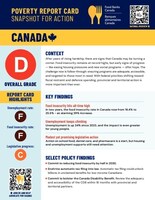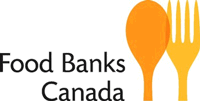National report spotlights the devastating impact of deepening poverty, rising youth unemployment, and recommends three poverty reduction policies to build a stronger Canada
TORONTO, Sept. 16, 2025 /CNW/ - Poverty and food insecurity in Canada has risen almost 40% over the past two years, placing Canada at a historic crossroad, according to Food Banks Canada's national 2025 Poverty Report Card.
Despite the bleak findings of the newly-released report, which grades the Government of Canada's 2025 poverty reduction efforts as a D, Food Banks Canada CEO Kirstin Beardsley says the data also highlights emerging positive indicators that the federal government can focus on to build a stronger Canada where no one goes hungry.
Although the report offers hope that Canada may be turning a corner in addressing food insecurity, it also spotlights concerning trends that underscore the complexity and pervasiveness of poverty in Canada. While each province and territory faces unique challenges, the new report confirms that, on a national basis, 25.5% are struggling with food insecurity – and the country is falling short when it comes to youth unemployment, housing affordability and adequately-funded social supports.
Fragile Signs of Hope Indicate Reducing Food Insecurity in Canada is Possible
"While governments have not yet taken action to meet the scale of the crisis, newly introduced programs – including ambitious poverty-reduction strategies, affordable housing pilots and new social programs like the Canadian Dental Care Plan and the National School Food Program – are showing early promise for greater adoption and expansion," says Food Banks Canada CEO Kirstin Beardsley.
"With proper long-term investment and modifications to improve access, these kinds of initiatives offer Canada a new and stronger future," explains Beardsley. "Food Banks Canada's analysis shows that with bold collective action from all governments, we can make real and lasting change. It is possible to reduce food insecurity in Canada by 50% by 2030," she urges.
2025 National Poverty Report Card Policy Recommendations
Food Banks Canada's 2025 Poverty Report Card recommends prioritizing three measurable, practical and pivotal poverty reduction strategies:
Canada Overall Grade |
Key Findings |
Policy Prioritization Recommendations |
D 2025 GRADE |
Unemployment: • Grade = F • +34% since 2023; Food Insecurity: • Grade = F • 25.5% of households Legislative Progress: Grade = C "After years of rising hardship, |
• Commit to reducing food insecurity in Canada by 50% by 2030 • Enshrine automatic tax filing into law to unlock billions in unclaimed benefits for low-income Canadians • Review and modernize supports for low-income workers (EI and other programs) |
About Food Banks Canada
Food Banks Canada is the leader in addressing food insecurity in Canada. Our mission is to provide national leadership to relieve hunger today and prevent hunger tomorrow in collaboration with the food bank network from coast to coast to coast. For over 40 years, food banks have been dedicated to helping people living in Canada with food insecurity. Over 5,500 food banks and community organizations come together to serve our most vulnerable neighbours, who – this year – made over 2 million visits to these organizations in one month alone, according to our HungerCount report. Since 2010, Food Banks Canada has shared over $1 billion in food supports and over $275 million in funding to help maximize collective impact and strengthen local capacity – while, backed by leading research, advocating for meaningful actions from governments to counter hunger and its root causes. Our vision is clear: create a Canada where no one goes hungry. Visit foodbankscanada.ca to learn more.
SOURCE Food Banks Canada



Share this article